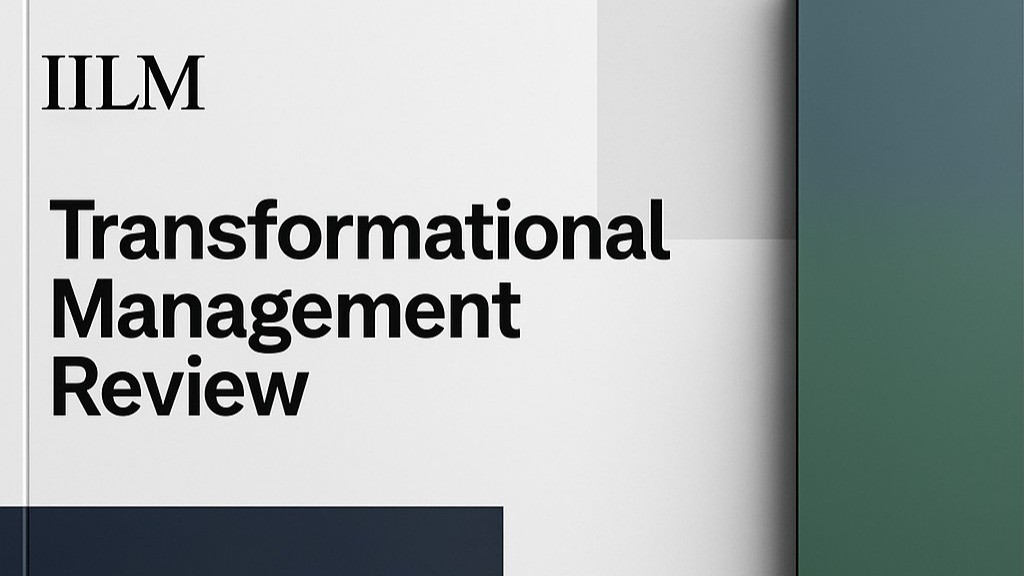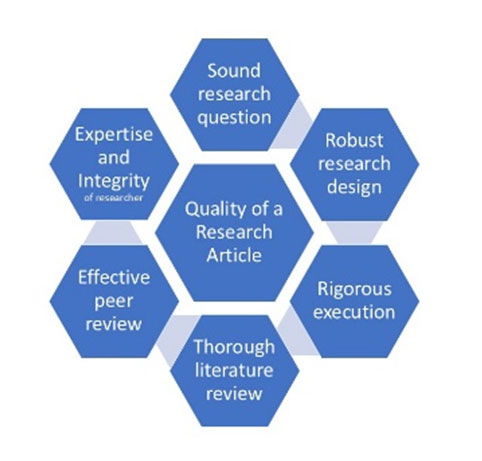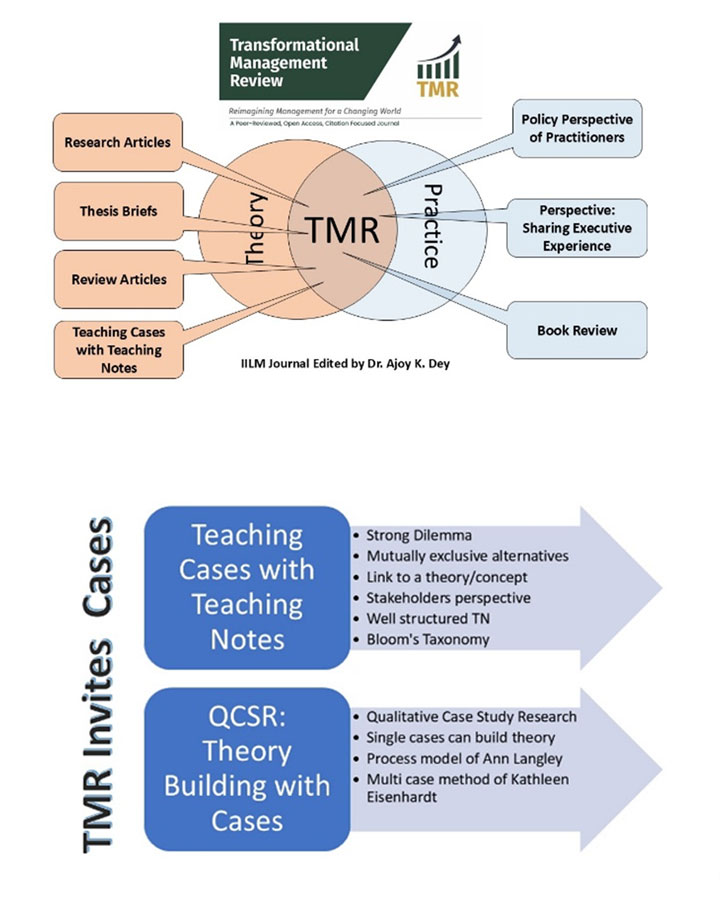


Transformational Management Review (TMR) is a peer-reviewed academic journal committed to advancing the frontiers of management research and practice in response to the dynamic and complex challenges facing organizations today. The journal serves as a platform for scholars, practitioners, policymakers, and educators to explore critical questions in management by integrating diverse theoretical perspectives, empirical approaches, and practical insights. TMR welcomes research grounded in real-world management experiences and practical insights. It particularly encourages submissions that bridge the gap between theory and practice, offering a deeper understanding of managerial phenomena. As an authentic intellectual home for experience-based research, it supports work that captures the complexity, dynamism, and lived realities of organizational life. The journal embraces a wide range of methodological approaches – from case-based inquiry to statistical analysis and formal modelling – provided they yield meaningful contributions to management knowledge. Submissions engaging with emerging topics such as organizational transformation, agile practices, design thinking, strategic innovation, leadership in turbulent environments, and the behavioral implications of technological change are especially welcome. Contributions that extend theory, propose novel conceptual frameworks, or generate actionable insights for managers and institutions are particularly encouraged. TMR is committed to academic rigor and relevance. All submissions undergo a thorough double-blind peer review process to ensure the publication of original, high-quality, and impactful research. The journal publishes a broad spectrum of article types, including empirical studies, theoretical essays, integrative reviews, policy perspectives, pedagogical innovations, case studies, and book reviews.
TMR aims to advance management scholarship by publishing rigorous, relevant, and impactful research that:
TMR welcomes interdisciplinary and domain-specific research across a broad spectrum of management disciplines, including but not limited to:
Contributions that integrate theoretical rigor with practical relevance, demonstrate methodological robustness, and offer clear implications for practice and policy are particularly encouraged.

Open Access: All articles published in TMR are freely accessible to readers worldwide, ensuring maximum visibility and citation potential. The journal does not charge authors any article processing fees; all publication costs are borne by IILM.
Originality and Ethical Standards: TMR publishes only original research that has not been published or submitted elsewhere. Authors must confirm the originality of their work and disclose any conflicts of interest. The journal adheres to strict ethical standards, including zero tolerance for plagiarism and data fabrication.
No Article Processing Charges: Publication costs are fully borne by IILM, enabling authors to publish without financial barriers.
Digital Object Identifier (DOI): Each article is assigned a DOI to facilitate accurate citation and long-term accessibility.
Rapid and Constructive Peer Review: TMR follows a double-blind peer review system focused on quality and constructive feedback. Our ‘Review to Improve’ philosophy ensures timely feedback aimed at enhancing manuscript quality.
Author Engagement and Dissemination: Authors can promote their work through podcasts, accessible summaries, and shareable article links to reach wider academic and practitioner audiences.
Fast Track Review: The review cycle time of submissions from emerging scholars and early career faculty may be expedited.
ESG Principles & SDGs: Articles that explore the integration of Environmental, Social and Governance (ESG) principles and actively contribute to the achievement of the United Nations Sustainable Development Goals (SDGs), are preferred.

TMR is committed to upholding publication ethics as prescribed by COPE (Committee on Publication Ethics). All submissions must be original, unpublished, and not under simultaneous consideration elsewhere. Authors are required to disclose any potential conflicts of interest and comply with ethical research protocols.
Authors retain full copyright of their published work while granting TMR a non-exclusive license to publish and disseminate under an open access agreement. Articles are distributed under licenses that permit sharing and adaptation with appropriate attribution.
The views expressed in published articles are those of the respective authors and do not necessarily reflect the views of the editorial board, the journal, or IILM. The publisher bears no responsibility for any consequences arising from the use of published content.
Authors are invited to submit original manuscripts written in English, formatted in MS Word using Times New Roman, font size 12, and single line spacing. Authors must format their papers following APA Style 7th Edition.
Articles for the sections of Policy Perspectives, Research and Review may be up to 7000 words. Similarly, for Executive Perspectives 3000 words, Teaching Case with Teaching Note 10,000, Thesis Briefs 1000 and Book Review 2000 words. Detailed submission instructions and templates are available upon request (Send query: connect.tmr@iilm.edu).
Articles showing ESG connection or contributing to SDGs will be given preference.
Authors are required to submit the anonymised version of the article separate from the title page. The title page should include article title, author names (clearly identifying the corresponding author), affiliations, and addresses. Moreover, the title page should contain abstract of not more than 200 words, up to five keywords, and highlights. Article highlights are a short collection of 3 to 5 bullet points (each a maximum of 80 words) that should capture novel results of the research as well as any new method used in the study. Highlights will help increase the discoverability of the article via search engines. Other relevant information such as acknowledgements, conflict of interest, funding, roles of each author and use of generative AI should be included in the title page.
Prior to submission, authors are strongly encouraged to undertake a thorough proofreading process to eliminate spelling and grammatical errors, confirm consistency between in-text citations and the reference list, and ensure that appropriate permissions have been secured for the use of copyrighted materials, including those obtained from online sources.
Furthermore, every manuscript submission must be accompanied by a Turnitin similarity report.
All submissions must pass through a double anonymised peer review process. Manuscripts must be original, unpublished, and not under consideration elsewhere.
At TMR, we acknowledge the growing role of artificial intelligence (AI) in the research and writing process and recognize its potential to support authors in various ways. When used responsibly, AI tools can assist in generating ideas, accelerating the discovery of insights, synthesizing or analyzing findings, refining language, and improving the overall structure of a manuscript. At the same time, we uphold the highest standards of accuracy, transparency, and integrity in scholarly publishing.
In line with this commitment, authors are required to disclose any use of AI or AI-assisted technologies within their submission. Generative AI may not be listed as an author under any circumstances. Authors must continue to cite original sources, refrain from using AI to create or manipulate images or figures, and explicitly state on the title page any use of generative or AI-assisted tools in the research or writing of the manuscript. This disclosure should include the name of the tool, a description of how it was used, and the rationale for its use.
Importantly, manuscripts will not be rejected solely on the basis of declared AI use. However, if an editor determines that AI tools have been used inappropriately (such as by generating inaccurate content, plagiarizing, or misattributing prior sources) and such use was not properly disclosed, the submission may be rejected at any stage of the publication process.
To uphold academic integrity, TMR screens all submitted manuscripts using Turnitin to identify any overlap with previously published work. The journal is a member of the Committee on Publication Ethics (COPE) and is fully guided by its Code of Conduct and Best Practice Guidelines for editors.
For research articles, the overall similarity index must not exceed 10%, with tables, figures, and references excluded from this calculation. Any portion of AI-generated content is strictly prohibited and should register a zero percent index. Teaching cases and their teaching notes will undergo similarity checks as separate documents.
Thesis briefs submitted to TMR are reviewed with the same level of rigor as full-length articles, following a double-blind peer review process. Only those briefs that demonstrate strong scholarly merit and align closely with the journal’s scope will be selected for publication.
At Transformational Management Review (TMR), all manuscripts undergo a double-blind peer review processdesigned both to evaluate scholarly work and to support author development. To preserve impartiality, the identities of authors, reviewers, and editors remain confidential throughout the process.
The review begins with an initial screening by the Editor-in-Chief, who evaluates the submission’s originality, quality, and alignment with the journal’s scope. Manuscripts deemed unsuitable at this stage are desk rejected, while those meeting the standards are assigned to an editor for further consideration.
The assigned editor invites at least two independent reviewers (and may seek additional reviewers, if necessary) to conduct a detailed evaluation. Using Microsoft Word’s reviewing tools, reviewers provide embedded comments, suggested revisions, and a formal recommendation: accept, minor revision, major revision, or reject. The editor then consolidates reviewer feedback. If revisions are advised, the manuscript is returned to the authors for revision. A paper requires two positive recommendations for acceptance. In cases of conflicting reviews, the manuscript may be referred to a third reviewer or the Editor-in-Chief, who makes the final determination.
After integrating the reviewers’ and editor’s perspectives, the Editor-in-Chief compiles a composite review containing all comments and recommendations. A final editorial decision—accept, accept with minor changes, revise and resubmit, or reject – is then communicated to the authors.
For revised manuscripts, the Editor-in-Chief again oversees the process. Where a decision is “revise and resubmit,” the manuscript is reassigned to the same editor, who may involve the original reviewers or undertake the review independently. Each review cycle follows the same process as the initial round, with the Editor-in-Chief always responsible for the final decision.
TMR aims to provide authors with an initial editorial response within two weeks of submission, though the complete review-to-acceptance cycle may take six to eight months. Once accepted, the manuscript is allocated to a forthcoming issue and sent to the production team for copyediting and formatting. Before final publication, authors receive page proofs for minor corrections. The final, proofread version is then published online, and the authors are notified.
The Editor-in-Chief’s decision is final and binding in all matters related to manuscript evaluation and publication.
Please note: To safeguard the confidentiality of submitted research and uphold authors’ rights, TMR does not permit reviewers or editors to use generative AI or AI-assisted technologies (such as ChatGPT or similar tools) during the peer review or manuscript evaluation process. This policy is in line with the journal’s established GenAI guidelines.
Under the Diamond Open Access model, the rights granted to TMR by authors apply exclusively to the published version of the article. The journal does not request, nor claim, any rights over the underlying research itself.
Authors retain full freedom to reuse their published work in future outputs without seeking permission or paying fees to TMR. Examples include reproducing the article as part of a thesis, incorporating it into a book chapter, or using it for self-promotion.
In addition, authors may share their article for academic purposes such as classroom instruction, conference presentations, inclusion in non-commercial Massive Open Online Courses (MOOCs), or by producing translations and authorizing others to do so for non-commercial scholarly collaboration.
Institutions also retain certain rights: they may distribute copies for classroom and internal training, include the work in (online) coursework and courseware programs for use within the institution, share in non-commercial MOOCs, and deposit the article within theses and dissertations, provided a DOI link to the published version is included.
TMR does not require a separate licensing agreement with authors whose work is accepted. Instead, this policy statement clearly communicates the rights available to both authors and their affiliated institutions.
TMR encourages authors to give access to the supplementary materials such as data sets, applications, images and sound clips to enhance research and collaboration. Authors should store these on any open data storage platform (like OSF https://osf.io/) and embed the link in the article at the appropriate place. Supplementary material should be accurate and relevant to the research. Cite all supplementary material in the manuscript text. Submit supplementary material at the same time as the article.
Along with the uploading of the final accepted version of the article (applicable only for policy perspective, research and review articles), authors must send (by email to submission.tmr@iilm.edu citing the title of the paper) a 300 words summary of the article in simple English language. Authors may also submit a Podcast (optional) of maximum two minutes. The summary and the podcast will help in disseminating the findings of the article to the wider audience.
Authors may submit articles here: submission.tmr@iilm.edu
For queries related to submissions, or general information, please reach out to: connect.tmr@iilm.edu
Publishing with TMR connects you to a global network of scholars and practitioners dedicated to advancing management knowledge and practice. Amplify your research impact and contribute to shaping the future of management.